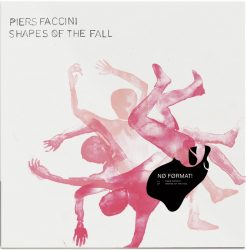Well crafted intimate and evocative music.
 It feels like this reviewer has been living on the edge recently – the edge that is of whatever genre definitions might normally apply. There has been a succession of albums that test the limits, as does Piers Faccini’s, ‘Shapes of the Fall’. There are clearly Mediterranean, North African / Arabic influences but there is also enough of a folk/roots component to justify reviewing the disc. As Faccini puts it:
It feels like this reviewer has been living on the edge recently – the edge that is of whatever genre definitions might normally apply. There has been a succession of albums that test the limits, as does Piers Faccini’s, ‘Shapes of the Fall’. There are clearly Mediterranean, North African / Arabic influences but there is also enough of a folk/roots component to justify reviewing the disc. As Faccini puts it:
‘If my songs were maps I’d want them to stretch from the English moors to the Saharan dunes via the plains of the Mediterranean’
The fact that that this is a very good collection is another reason to have a listen. Faccini is of British/Italian descent and seemingly something of an international citizen. On this album, his vocals are crystal clear, beautifully enunciated English (think Nick Drake in terms of clarity) apart from the occasional Arabic verse. He has a lovely voice.
Faccini was born in London to an Italian father and an English mother, his family moving to France when he was five. His credentials are impressive although they tend to point toward world music rather than americana. In 2009, his album, ’Two Grains Of Sand’, was nominated for the French independent music award, Le Prix Constantin and voted album of the year by the listeners of French national radio, France Inter. His album with the cellist Vincent Segal, ’Songs of Time Lost’, was in NPR’s top ten world music albums of 2014. It was one of Songlines top 10 albums of 2014 as well as in their Greatest World Music Albums of the last five years. He has played with a host of different musicians over the years and on this occasion, Ben Harper and Abdelkebir Merchane contribute. As the French would have it Faccini seems to be an ‘artiste engagé’ – so no surprise about the themes of the current collection.
The accompanying PR copy, rather than merely offering praise, does help place the music and the artist:
‘Faccini’s elegiac new album – considers whether or not humankind is deserving of a reprieve. The musical arrangements reflect Faccini’s South Italian ancestry, bridging Southern Europe with Africa and the Near East by spanning Arab-Andalusian and Sephardic modes and rhythms and the trance traditions drawn from the Maghreb region and the Berber people, alongside the Gnawa music of Morocco’.
Well, that sounds like a rich stew?
‘Shapes of the Fall’, is the ninth album in a 20-year career and is an acoustic affair with string quartet arrangements by Spanish composer Luca Suarez. These combine with a strong sense of rhythm on a number of tracks and Faccini’s hybrid fretless Guitar/Oud; all of which create a lush warm wash of sound. Faccini’s creation is rooted in a story by Gabriel Garcia Marquez (always an interesting and challenging author) ‘A Very Old Man With Enormous Wings’ wherein the author reflects on the duality of human nature as though it were a spinning coin that might land either on compassion or cruelty (shades of Luke Rhinehart’s, ‘Dice Man’.)
The lyrics are a little opaque at times and an obvious narrative is not always discernible. However, delivered as they are with vocal flair and sumptuous backing, they sometimes seem less than sense and more like beautiful sounds; I hesitate to say poetic but in fact, Faccini is a published poet with his first collection, ‘No Ones Here’, dating from 2016.
The essence of Faccini’s thinking is whether or not humanity will survive and take flight, or fall to destruction as he ravages the planet on which he relies so heavily. The opening track, ‘They Will Gather No Seed’, anticipates a dismal future when the damage is done. It is seemingly a tale of refugees struggling to survive – possibly human, possibly animal, though such distinctions will ultimately be irrelevant.
‘Dunya’, ‘All Aboard’, and, ‘Firefly’, all wear their African influences openly and the latter put me in mind of some of the recent offerings from Robert Plant. It does though introduce a rather incongruous, literally shouted, ending that bears little relation to the rest of the music; it’s a small quibble. However, the lyrics do illustrate the point about understanding and comprehensibility; here’s the fifth verse from, ‘Firefly’:
I was at the fall drawn to the edge / You were at the lock torn at the thread / I was at the flame the root the creed / You were at the cut but why believe? / But why believe?
Here’s another example from, ‘ Lay Low to Lie’:
Purpose is a fault / Cracked under the vault / Purpose is a fault /Reset time to nought’.
It would be helpful with music of this much ambition for there to be some text or sleeve notes to further illuminate the artist’s intentions (one of the strengths of vinyl?). It seems that only the lyrics are printed on the CD sleeve and it feels like a trick missed.
Tracks that fall more easily into the folk/roots mode and sound that we might readily identify are the opener, ‘They Will Gather No Seed’, as well as, ‘Foghorn Calling’, ‘Paradise Fell’ and the final track, ‘The Real Way Out. It’s all fine fare whatever the stylistic considerations.
Americana or not, this is a distinguished album by an established artist who has a vision; one that, in my research and reading, I have probably only touched on. Lyrically it remains a little obscure but the gist of Faccini’s thinking is apparent. The sounds, vocal and instrumental, are first-rate and recommended.


